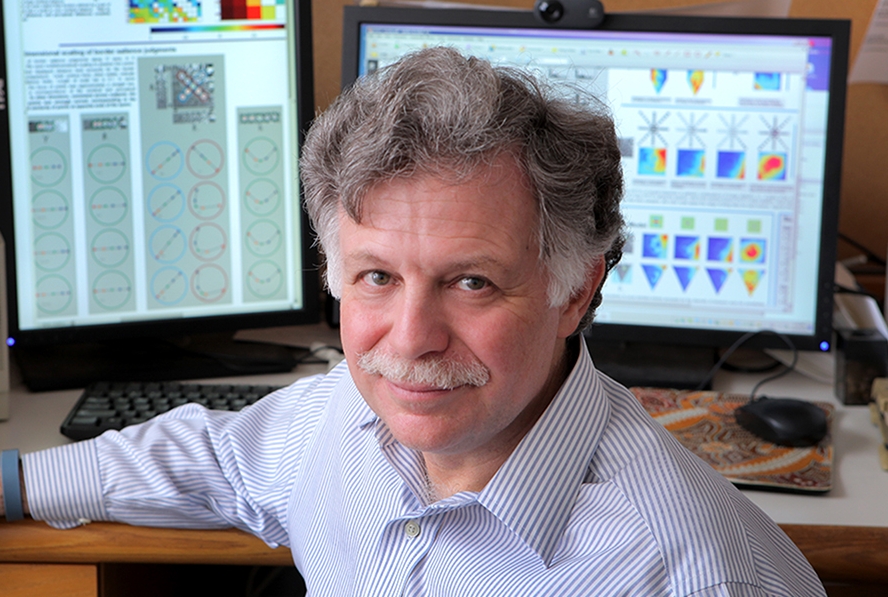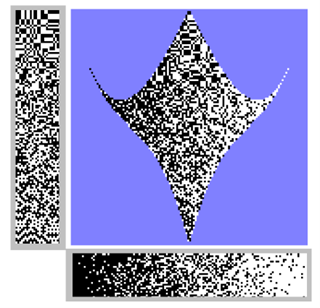
Research
The mission of the laboratory is to advance the understanding of higher brain function at the level of circuits and systems, and how it is altered in disease. We focus on sensory systems, including vision, gustation, and olfaction, as models to understand design principles for neural computations, active sensation, and sensorimotor integration, how these design principles are implemented in neural hardware, and how the properties of individual neurons relate to the function of large populations. Overall, the laboratory focuses on areas of basic and clinical neuroscience in which combining mathematical, computational, and experimental approaches can lead to significant progress.
Figure 1

One main thrust of the research is directed at understanding the design principles of sensory processing, both in the sensory periphery and in the brain, and how these design principles are implemented in biological hardware. We seek to determine the aspects of sensory information that are represented, the features of the activity of individual neurons and neural populations that support these representations, and realistic models for how these representations are transformed. These questions are addressed primarily in the visual system, via neurophysiologic studies at the single-cell and multineuronal level (with Keith Purpura) and via psychophysical studies (with Mary Conte). Experimental investigations are complemented by theoretical studies, including (a) the development of approaches to analyze multineuronal activity and (b) strategies for stimulus design that bridge the gap between methods motivated by analytical convenience, such as white noise and sinusoids, and methods based on ethologically relevant stimuli, such as natural scenes.
The second main thrust of the research is directed at understanding how disease alters the integrative functions of the brain. In many neurologic diseases, including epilepsy and chronic brain injury, alterations in the dynamics of neuronal populations plays a major role in pathogenesis and/or symptomatology. In conjunction with Nicholas Schiff and colleagues, we are analyzing EEG, functional imaging, and anatomical imaging in brain injury patients to probe these dynamics and their relationship to spontaneous and induced fluctuations in cognitive ability and behavior. Population models of thalamocortical interactions play an important role in shaping the analytical approach. An integral part of the research is the development of dimension-reduction and statistical methods for analysis of multichannel datasets such as the EEG, which contain rich dynamical information, but also nonstationarity, noise, and artifacts with complex statistical structure.
Current Projects:
- Perceptual spaces, especially visual texture, semantic spaces
- Image statistics in natural and medical images
- Active vision, especially control of fixational eye movements
- Active olfaction, especially normative theories and antennal movements
- Large-scale brain dynamics in disorders of consciousness
Bio
Victor earned an undergraduate degree in mathematics from Harvard College in 1973 and then completed the MD-PhD program at Rockefeller and Cornell, with thesis research in visual neuroscience under the mentorship of Bruce Knight, Robert Shapley, and Floyd Ratliff. Following a neurology residency at The New York Hospital under Fred Plum, he joined the Biophysics Laboratory at Rockefeller University and then moved to Weill Cornell in 1986. He was named Fred Plum Professor of Neurology in 1991 and leads the Division of Systems Neurology and Neuroscience in the Feil Family Brain and Mind Institute.
Distinctions:
- McKnight Scholars Award
- NINCDS Teacher-Investigator Award: Klingenstein Fellowship in Neuroscience
- Cornell Discovery Award
- co-Editor-in Chief, Journal of Computational Neuroscience
- co-Editor-in-Chief, Vision Research
